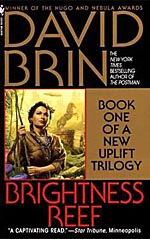
![]() couchtomoon
couchtomoon
11/25/2015
![]()
Huck shrugged two stalks, as if to say she couldn't be bothered with petty legalistic details. (62)
Set within his Uplift Universe crowded with sapient species, Brin abandons the Earthling-dominated dolphin-chimp-human narrative for something less familiar and (slightly) more alien. Like Startide Rising (1983), it still feels youthful, even childish, which makes it hard to take seriously at times, and when it does get serious, sometimes the dump of moral entanglements and plot movements musses up what could be a fresh little tale.
I felt a twirl in my heart-spine.(94)
The supposed-to-be fallow planet of Jijo is secretly home to eight alien races of illegal settlers, including a tribe of Humans. Many of the sooners (yes, the illegal settlers are called sooners. they also love football and frakking...) live in a precarious alliance with one another, having little in common but relying on the truce to conceal their presence from Galactic law, while other groups choose to pretend pre-sentience. But suspected Galactic investigators arrive and the future of the races on Jijo is threatened.
...leaving just one buried in her well-thumbed copy of Lord Valentine's Castle. She groaned. (240)
The most enjoyable thread is "Alvin's Tale," a group of mixed race adolescent aliens who obsess over human fiction, particularly American classics and science fiction, while on the constant lookout for adventures. They adopt human names. They adopt human mannerisms that don't quite match their body parts. It's unrealistic (and too humanistic) that cultural artifacts from humanity, like fiction and the word sooner, would influence so many alien races, in such a far future, but it's a humorous thread, the only one that easily kept my attention. Plus, the subtextual commentary on cultural hegemony is relevant to current events.
Ur-Jah's voice trailed off as Lester, the human, rocked his head--a simple gesture of negation lately fashionable throughout the Commons, among those with heads. (34)
...but the commentary is undermined when all peoples of the Eight Great Races (aka aliens!) behave in such human ways, without reciprocal human adoption of non-human cultural habits. Humans: the galaxy's Ugly Americans.
(And this observation did bring to mind the unfair comparison of Naomi Mitchison's Memoirs of the Spacewoman (1962), which has the coolest assortment of non-humanish aliens ever.)
"Because we uplifted ourselves, without the help of a patron?"
Ling laughed. "Oh, that old myth!"(160)
The overarching question that haunts the entire series: Who, if anyone, uplifted Humanity to sapience? mirrors current debates on evolution, and even reminds me of the "It was aliens!" guy who just can't quite comprehend human ingenuity (and the hard-backed labor of a duty-bound peasantry) but, yes, the Maya actually did that. And, yes, Egyptians actually did that. It's another point that catches my eye when it starts to glaze over from the plot of this guy doing this and that girl doing that. So, lots of this and that going on, I guess is what I'm saying.
-in the long run, the Universe as a whole owes you nothing. - The Scroll of Hope (621). (Not relevant to what I'm saying. I just like nihilism. Especially around the holidays.)
Lots of characters, lots of threads, and not enough emotional development, internal conflict, or philosophical pontificating to foster reader empathy or to justify the high word count. The external conflict lacks the intensity to hold a casual reader's interest. Like the last Brin I read, the light fabric of the tale doesn't match its unwieldy structure. It will feel miresome for any reader not intimate and/or obsessed with this Uplift Universe.
http://couchtomoon.wordpress.com